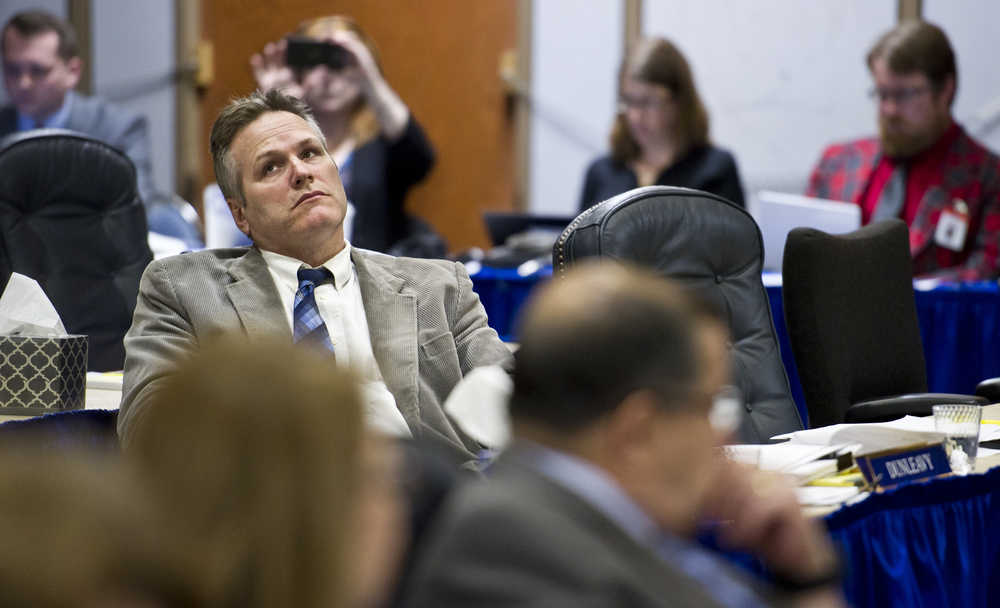The Alaska Legislature is bound for some kind of double-overtime, with lawmakers — even after a four-month extended regular session — unable to reach a deal to fix Alaska’s $4 billion annual budget deficit.
Wednesday was the 121st and final constitutional day of the regular legislative session, but at the Empire’s press deadline, it remained unclear whether lawmakers would simply vote to extend the regular session or if Gov. Bill Walker would be forced to call a special session.
Even without a special session, all indications were that lawmakers intended to work late into the night, with particular attention paid to the House, where negotiations between the Republican-led House Majority and the Democratic-led House Minority are ongoing.
“We are working on a deal to be able to fund the budget, so we’re working on different aspects of that,” said Speaker of the House Mike Chenault, R-Nikiski, about 3:45 p.m.
The Republican-led majority in the Senate is large enough and organized enough that it appears capable to take any action.
In the House, things are different.
Funding the state operating budget in the coming year is expected to require money from the $8.2 billion Constitutional Budget Reserve, but spending from the reserve requires a three-quarters vote of the House and a three-quarters vote of the Senate.
In the House, the 26-member majority doesn’t have enough members to reach that three-quarters margin without the support of minority Democrats.
The majority might outflank the minority and fund the budget instead with the Alaska Permanent Fund’s earnings reserve, an action that requires only 21 votes (a simple majority in the 40-member House) but using that fund would likely be blocked by the “Musk Ox Caucus,” a group of moderate Republicans within the majority. That’s what happened last year, and lawmakers said it would happen again.
In the meantime, negotiations are continuing, and even though the Alaska Constitution calls for a midnight finish, lawmakers were expected to stay at work if a deal seemed possible.
“I don’t think the clock would keep us from keeping the session open,” said Rep. Jim Colver, R-Palmer.
“I think that we can get there if people will just continue to negotiate,” Chenault said.
“We do have the ability to extend ourselves,” he added, but said he doesn’t know if the House has the three-quarters vote needed.
Even if a budget deal happens in the waning hours of the regular session, Walker has previously said he intends to call a special session to address long-term fixes for the state budget.
While the budget was the top item of business on the 121st day, other items also made the Legislature’s agenda.
Senate rewrites bill cutting oil and gas subsidies
The Alaska Senate has approved its own version of House Bill 274, a measure originally offered by Walker as the second-largest piece of his plan to erase the state’s $4 billion deficit.
The state distributes tax credits as incentives to operate in Alaska, but with state revenue collapsing, lawmakers have been reconsidering the subsidy.
The House approved a version of HB 247 that would save $280 million per year by fiscal year 2020. The Senate’s version, which passed 14-6, promises $130 million in savings in FY 2020.
The Senate version leaves untouched a provision that was the biggest contributor to an explosion in the amount of credits the state owes oil and gas producers and drillers.
That provision, which underwrites 35 percent of a company’s losses if it loses money while operating in Alaska, was intended for new companies who have not yet begun producing oil.
If North Slope crude oil prices drop below $46 per barrel, however, large North Slope producers lose money with every barrel they pump, and they become eligible for the “net operating loss” credits.
The House version of the bill fixes this loophole in the state program. The Senate version does not, and it walks back other changes by the House, greatly reducing the projected bill’s projected savings.
The House was expected Wednesday to vote on the Senate version of the bill and reject it.
“I just don’t see the votes there,” Colver said.
If the House disapproves of the Senate version, the two versions of the bill will go to a conference committee that will be tasked with creating a compromise.
If the regular session ends, that process would become much more complicated. All unpassed bills die at the end of a session, and Walker would be forced to reintroduce a version of HB 247 under a new number. The bill would then re-enter the regular committee process in both the House and Senate.
Marijuana bill heads to governor
On Wednesday morning, the House and Senate agreed to a compromise version of HB 75, a bill that allows unincorporated communities to opt out of the state’s marijuana industry with a local vote. The bill also sets a 12-plant limit for home-growing operations.
The bill must be signed into law by Walker before becoming effective.
To learn more about the bill and get the latest updates on the legislative session, visit www.juneauempire.com.
• Contact reporter James Brooks at james.k.brooks@juneauempire.com or at 419-7732.

